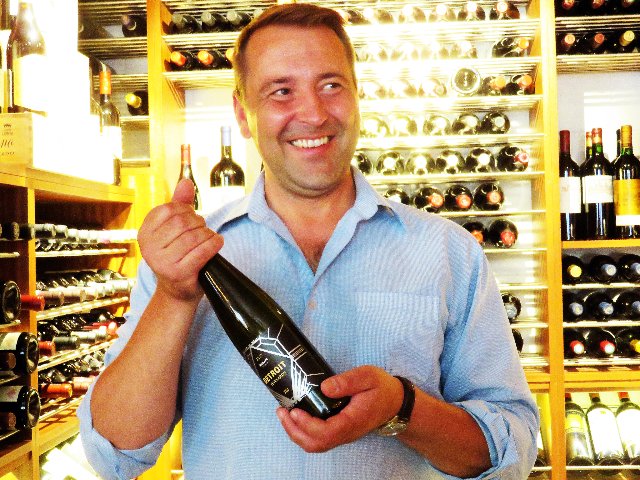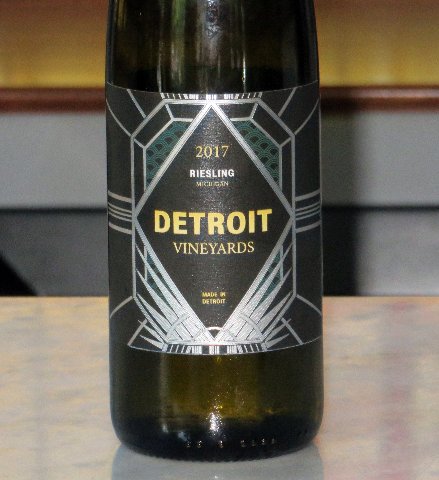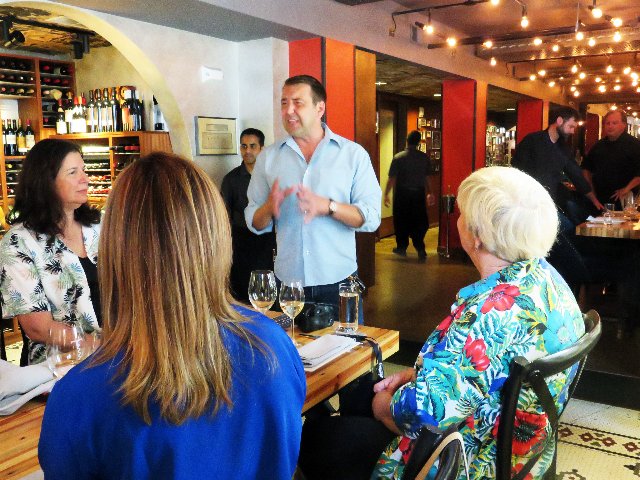Detroit Wineries
Not Just Cars from Motown
By: Anne Siegel - Sep 29, 2018
There’s little doubt that Detroit is better-known for making cars than chardonnay. But a visionary winemaker is trying to change all that with an ambitious project to re-establish vineyards in the heart of downtown Detroit.
Blake Kownacki, 40, is no rookie to the wine trade. He trained as a winemaker in California and has worked as a vineyard manager in Australia. He also was the winemaker and vineyard manager at Cherry Creek Celler, located in the Irish Hills of Michigan, from 2010 to 2015.
It was in 2014 that he started to think seriously about re-establishing vineyards near downtown Detroit. He and his wife, both Detroit natives, wanted to be closer to family and friends. Now he’s the co-owner of Detroit Wines, a business that’s just starting to pick up traction in the state’s well-known wine industry.
Most folks have no idea of Detroit’s winemaking history. In 1702, Antoine de la Mothe Cadillac wrote about the vineyards he planted along the Detroit River (some of the first in North America). Prior to Prohibition, Kownacki notes, several Michigan wineries existed. One of these became known as St. Julian Wine Company, which today produces more than 50 different kinds of wine.
According to Kownacki, southeast Michigan has several microclimates that are well-suited for growing quality wine grapes, according to a local wine expert. The state produces 2.75 million gallons of wine annually.
Detroit Winery (run by Kownacki and a growing team of employees) has been making a small splash in the boutique market, offering a small selection of wines to local grocery stores, restaurants and wine-tasting rooms that have sprung up across the city. The wines average about $25 a bottle.
During a recent wine-tasting experience for travel writers at Vertical Detroit, a popular Detroit wine bar, Kownacki gleefully unveiled four of his wines: Riesling, chardonnay, mead and cabernet franc (which is similar to a rosé). All the wines were delicious, eliciting oohs and aahs from the guests. The Riesling packed an extra surprise: it is a light wine that’s not overly sweet.
Kownacki’s vision goes beyond pressing grapes and bottling wine. He is working with the local community. Several years ago, he contacted nearby residents with open lots who showed an initial interest in the idea of growing grapes. Kownacki planted the vines and has been hands-on in teaching residents what it takes to maintain a vineyard.
It takes three to four years for vines to produce enough fruit, but Kownacki pledged to purchase all the fruit grown in these urban vineyards. This was the first year he harvested a small number of grapes from the neighborhood.
The economic impact of Michigan’s wine industry continues to grow: in 2017, it is estimated that wineries had more than a $5 billion economic impact on the state’s economy. A significant part of this economic contribution were the 1.7 million visits to wineries elsewhere in the state, combined with $252 million in tourism spending.
That’s the draw Kownacki hopes his own winery and tasting room will have in the years to come. For now, he expects that the 200,000 pounds of Michigan grapes he ordered for this year’s harvest will produce about 12,000 cases of wine. His goal is to significantly increase the number of Detroit-grown grapes each year.
Winemaking isn’t a task for the faint-hearted. As this article was being written, Kownacki was keeping his fingers crossed that the bigger, new wine vats he ordered from overseas would arrive before the 200,000 pounds of grapes. Both vats and grapes are destined for Kownacki’s facility in the abandoned, well-known Stohs ice cream factory.
The factory is located in the northeast section of Detroit, not far from the city’s popular Eastern Market, one of the country’s oldest markets.
As the harvest season ramps up, Kownacki is adding a couple of extra hands to process the grapes. He’ll have to hire even more help once a wine-tasting room are retail facility are established in the refurbished building. This part of the business, which has the potential to bring in tourists’ dollars, is scheduled to open in February 2019.
Once all the pieces of Kownacki’s dream come together, he is certain that “families, fun and enjoyment” will combine for an exceptional agri-tourism experience. “Can you imagine our customers sampling some excellent wine, purchasing some bottles, and then going out and enjoying all this city has to offer? It’s an unbeatable combination, and everything tells me that now is the time to expand Michigan wine country to the Detroit Market,” Kownacki says.
Anne Siegel lives in Milwaukee and is a member of the American Theatre Critics Association. She has written about travel for the past three decades; her most recent postings can be found in The Wisconsin Gazette. She may be reached at asiegelz.wi.rr.com.
There’s little doubt that Detroit is better-known for making cars than chardonnay. But a visionary winemaker is trying to change all that with an ambitious project to re-establish vineyards in the heart of downtown Detroit.
Blake Kownacki, 40, is no rookie to the wine trade. He trained as a winemaker in California and has worked as a vineyard manager in Australia. He also was the winemaker and vineyard manager at Cherry Creek Celler, located in the Irish Hills of Michigan, from 2010 to 2015.
It was in 2014 that he started to think seriously about re-establishing vineyards near downtown Detroit. He and his wife, both Detroit natives, wanted to be closer to family and friends. Now he’s the co-owner of Detroit Wines, a business that’s just starting to pick up traction in the state’s well-known wine industry.
Most folks have no idea of Detroit’s winemaking history. In 1702, Antoine de la Mothe Cadillac wrote about the vineyards he planted along the Detroit River (some of the first in North America). Prior to Prohibition, Kownacki notes, several Michigan wineries existed. One of these became known as St. Julian Wine Company, which today produces more than 50 different kinds of wine.
According to Kownacki, southeast Michigan has several microclimates that are well-suited for growing quality wine grapes, according to a local wine expert. The state produces 2.75 million gallons of wine annually.
Detroit Winery (run by Kownacki and a growing team of employees) has been making a small splash in the boutique market, offering a small selection of wines to local grocery stores, restaurants and wine-tasting rooms that have sprung up across the city. The wines average about $25 a bottle.
During a recent wine-tasting experience for travel writers at Vertical Detroit, a popular Detroit wine bar, Kownacki gleefully unveiled four of his wines: Riesling, chardonnay, mead and cabernet franc (which is similar to a rosé). All the wines were delicious, eliciting oohs and aahs from the guests. The Riesling packed an extra surprise: it is a light wine that’s not overly sweet.
Kownacki’s vision goes beyond pressing grapes and bottling wine. He is working with the local community. Several years ago, he contacted nearby residents with open lots who showed an initial interest in the idea of growing grapes. Kownacki planted the vines and has been hands-on in teaching residents what it takes to maintain a vineyard.
It takes three to four years for vines to produce enough fruit, but Kownacki pledged to purchase all the fruit grown in these urban vineyards. This was the first year he harvested a small number of grapes from the neighborhood.
The economic impact of Michigan’s wine industry continues to grow: in 2017, it is estimated that wineries had more than a $5 billion economic impact on the state’s economy. A significant part of this economic contribution were the 1.7 million visits to wineries elsewhere in the state, combined with $252 million in tourism spending.
That’s the draw Kownacki hopes his own winery and tasting room will have in the years to come. For now, he expects that the 200,000 pounds of Michigan grapes he ordered for this year’s harvest will produce about 12,000 cases of wine. His goal is to significantly increase the number of Detroit-grown grapes each year.
Winemaking isn’t a task for the faint-hearted. As this article was being written, Kownacki was keeping his fingers crossed that the bigger, new wine vats he ordered from overseas would arrive before the 200,000 pounds of grapes. Both vats and grapes are destined for Kownacki’s facility in the abandoned, well-known Stohs ice cream factory.
The factory is located in the northeast section of Detroit, not far from the city’s popular Eastern Market, one of the country’s oldest markets.
As the harvest season ramps up, Kownacki is adding a couple of extra hands to process the grapes. He’ll have to hire even more help once a wine-tasting room are retail facility are established in the refurbished building. This part of the business, which has the potential to bring in tourists’ dollars, is scheduled to open in February 2019.
Once all the pieces of Kownacki’s dream come together, he is certain that “families, fun and enjoyment” will combine for an exceptional agri-tourism experience. “Can you imagine our customers sampling some excellent wine, purchasing some bottles, and then going out and enjoying all this city has to offer? It’s an unbeatable combination, and everything tells me that now is the time to expand Michigan wine country to the Detroit Market,” Kownacki says.
Anne Siegel lives in Milwaukee and is a member of the American Theatre Critics Association. She has written about travel for the past three decades; her most recent postings can be found in The Wisconsin Gazette. She may be reached at asiegelz.wi.rr.com.



